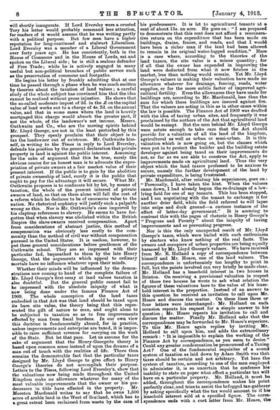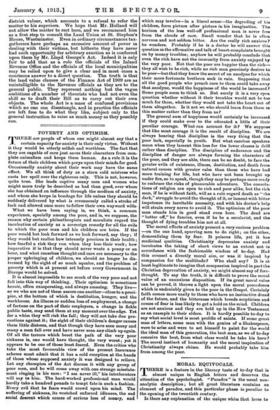THE LAND TAX INIQUITY. ORD EVERSLEY has done good service
by writing to the Times to protest against the Land Tax campaign which, according to rumour, Mr. Lloyd George will shortly inaugurate. If Lord Eversley were a crusted Tory his letter would probably command less attention, for readers of it would assume that he was writing partly with a political purpose. But few men have a higher reputation for long-continued and stalwart Liberalism. Lord Eversley was a member of a Liberal Government over forty years ago. He has consistently, both in the House of Commons and in the House of Lords, sat and spoken on the Liberal side ; he is still a zealous defender of Free Trade ; while he is actively engaged in many useful but non-political branches of public service such as the preservation of commons and footpaths.
He begins his letter by frankly admitting that at one time he passed through a phase when he was much smitten by theories about the taxation of land values ; a careful study of the whole subject has convinced him that the idea cannot be realized without gross injustice. He shows that the so-called moderate impost of 2d. in the on the capital value of land works out to a charge of 4s. 2d. on the annual value, and that in some cases where the land is heavily mortgaged this charge would absorb the greater part, if not the whole, of the landowner's net income. Messrs. Outhwaite and Co., who are the moving spirits behind Mr. Lloyd George, are not in the least perturbed by this prospect. They openly proclaim that their object is to tax the landowner out of existence. Mr. Outhwaite him- self, in writing to the Times in reply to Lord Eversley, defends his position by the general declaration that private property in land is against the public interest. Assuming for the sake of argument that this be true, surely the obvious course for an honest man is to advocate the expro- priation of private owners at a. fair market value of their present interest. If the public is to gain by the abolition of private ownership of land, surely it is the public that ought to pay for the advantage it will secure. What Mr. Outhwaite proposes is to confiscate bit by bit, by means of taxation, the whole of the present interest of private owners of land, so that on them alone will fall the cost of a reform which he declares to be of enormous value to the nation. No rhetorical sophistry will justify such a palpablie wrong as this. Nor is Mr. Outhwaite's case improved by his claptrap references to slavery. He seems to have for- gotten that when slavery was abolished within the British Empire the slave-owners received compensation. Apart from considerations of abstract justice, this method of compensation was obviously less costly to the com- munity than the method of civil war without compensation pursued in the United States. It is useless, however, to put these general considerations before gentlemen of the Outhwaite school. They are so impressed with their particular fad, bequeathed to them by the late Henry George, that the arguments which appeal to ordinary mortals have no influence whatever upon their minds.
Whether their minds will be influenced by the demon- strations now coming to hand of the complete failure of Mr. Lloyd George's first essay at land values taxation is also doubtful. But the general public cannot fail to be impressed with the absolute iniquity of what is now being done under the famous Finance Act of 1909. The whole conception of the land taxes embodied in that Act was that land should be taxed upon its bare site value, the theory being that this repre- sented the gift of nature to man, and ought alone to be subjected to taxation so as to free improvements effected by man from fiscal burdens. In our own view this doctrine is fundamentally absurd, for in practice, unless improvements and enterprise are taxed, it is impos- sible to raise sufficient revenue for carrying on the work of the State. But let that pass. Let us assume for the sake of argument that the Henry-Georgeite theory is based upon common sense instead of upon the dreams of a man out of touch with the realities of life. There then remains the demonstrable fact that the particular taxes designed by Mr. Lloyd George to give effect to Henry George's theories do not accomplish their purpose. Letters to the Times, following Lord Eversley's, show that the valuations now being made throughout the United Kingdom make no allowance whatever for many of the most valuable improvements that the owner or his pre- decessors in title have effected in the property. Mr. Moreton Macdonald writes to say that he owns 1,500 acres of arable land in the West of Scotland, which has to a great extent been reclaimed from waste by the care of his predecessors. It is let to agricultural tenants at rent of about 15s. an acre. He goes On: "I am prepared to demonstrate that this rent does not afford a remunera- tive return on the expenditure that has been made on buildings, drains, fences, and roads, and that I would. have been a richer man if the land had been allowed to remain in its original water-logged condition:* Here is a case where, according to the theories of the land taxers, the site value is a minus quantity ; for if all that the owner has expended in improving the land were deducted from what it now fetches in the market, less than nothing would remain. Yet Mr. Lloyd George's valuers in making their valuation have made no allowance whatever for drainage, fencing, roads, water supplies, or for the more subtle factor of improved agrie. cultural fertility. Even the allowances they have made for buildings are, according to Mr. Macdonald, less than the sum for which these buildings are insured against fire. That the valuers are acting in this as in other cases within. the law is possible. The Finance Act of 1909 was drafted with the idea of taxing urban sites, and frequently it was proclaimed by the authors of the Act that agricultural land would be exempt. But the men behind Mr. Lloyd George were astute enough to take care that the Act should provide for a valuation of all the land of the kingdom, agricultural as well as urban or semi-urban. It is this valuation which is now going on, but the clauses which were put in to protect the builder and the building estate developer against being taxed on their improvements do' not, as far as we are able to construe the Act, apply to improvements made on agricultural land. Thus the very object which the land taxers professed to be anxious to secure, namely the further development of the land by private expenditure, is being frustrated.
Mr. Macdonald, after relating his experiences, goes on : "Personally, I have taken the hint. When the valuers came down, I had already begun the re-drainage of a low- lying field for one of my tenants. This has been stopped, and I am negotiating with the tenant to exchange it for another drier field, while the field referred to will lapse into snipe and duck ground—a curious instance of the effect of latter-day government." It is amusing to contrast this with the pages of rhetoric in Henry George's "Progress and Poverty" about the iniquity of taxing improvements and so preventing progress.
Nor is this the only unexpected result of Mr. Lloyd George's taxes, which were hailed with such enthusiasm by electors who know nothing of the real facts. The owners and occupiers of urban properties are being equally harassed by Mr. Lloyd George's valuers. We have received from Mr. R. Holland a copy of correspondence between. himself and Mr. Hoare, one of the land valuers. The correspondence is unfortunately too lengthy to print in full, but the points involved can very briefly be made clear.. Mr. Holland has a leasehold interest in two houses in Brixton. On receiving a provisional valuation in respect of these two houses he wrote to ask what relation the figures of these valuations bore to the value of his lease- hold interest in the properties. Instead of an answer to. this question he received an invitation to call upon Mr. Hoare and discuss the matter. On these lines three or four letters were interchanged : Mr. Holland on each occasion repeats his request for a simple answer to his question ; Mr. Hoare repeats his invitation to call and discuss the matter. Finally Mr. Holland asks that the correspondence may be forwarded to Mr. Hoare's superiors. To this Mr. Hoare again replies by inviting Mr. Holland to call upon him, and adds the extraordinary remark : " It is impossible to explain the working of the Finance Act by correspondence, as you seem to desire." Could any greater condemnation be pronounced of a Taxing Act ? One of the fundamental requisites of a sound system of taxation as laid down by Adam Smith was that taxes should be certain and not arbitrary. Yet here the system of taxation, according to one of the men employed to administer it, is so uncertain that he confesses his inability to state on paper what effect a particular tax will have on a particular property. Mr. Holland, it must be added, throughout the correspondence makes his point perfectly clear, and tries to assist the befogged tax-gatherer by asking specifically what the tax would amount to if his leasehold interest sold at a specified figure. The corre- spondence ends with a curt letter from Mr. Hoare, the district valuer, which amounts to a refusal to refer the matter to his superiors. We hope that Mr. Holland will not allow the matter to rest here, and we recommend him as a first step to consult the Land -Union at St. Stephen's House, Westminster. Even in ordinary circumstances tax- gatherers have perhaps an excessive amount of power in dealing with their victims, but hitherto they have never had such opportunity for arbitrary exaction as is conferred upon them by Mr. Lloyd George's Act. Indeed it is only fair to add that as a rule the officials of the Inland Revenue Office and the officials of the local municipalities may be relied upon to give a clear and in most cases a courteous answer to a direct question. The truth is that the laud value clauses of the Finance Act of 1909 are as unintelligible to the Revenue officials as they are to the general public. They represent nothing but the vague ambitions of a number of theorists who had not even the skill so to draft their Bill as to carry out their own objects. The whole Act is a mass of confused provisions which no one can disentangle, and in practice the officials are left free to do what they like, subject only to the general instruction to raise as much money as they possibly can.
























































 Previous page
Previous page